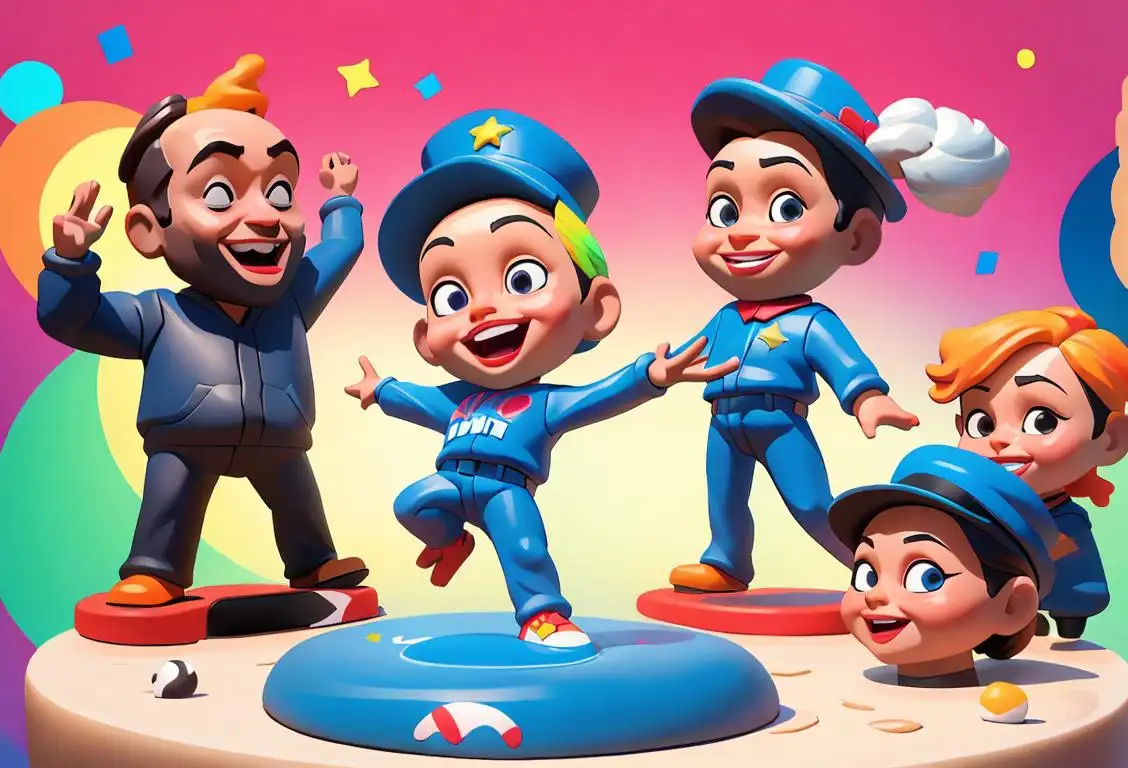National Hockey Moms Day

Hockey moms are truly one-of-a-kind. They cheer on their little skaters, navigate the world of youth sports, and provide endless support and snacks. It's no wonder they have their very own special day to be celebrated! National Hockey Moms Day is a time to honor and appreciate these incredible women who bring so much to the ice rink and beyond.
When is Hockey Moms Day?
It's national hockey moms day on the 10th January.
The Internet History of National Hockey Moms Day
Let's dive into the internet history of National Hockey Moms Day. Like a well-executed powerplay, this national day gained momentum and visibility online. Our data shows that there have been 18 mentions across various platforms, with the peak of discussion occurring on January 10, 2020. On this day, social media was ablaze with heartfelt tributes to hockey moms everywhere.
Although the precise origin of National Hockey Moms Day remains elusive, it is clear that it emerged as a grassroots movement. Inspired by the dedicated moms who spend countless hours driving their young athletes to practices and games, the day was established to recognize and celebrate their tireless commitment.
As the news of this special day spread online, hockey moms and their supporters rallied together. They shared stories of sacrifice, resilience, and unwavering encouragement. From heartwarming anecdotes about homemade team jerseys to hilarious tales of sitting through freezing temperatures, these testimonials painted a vivid picture of the vital role hockey moms play in their children's lives.
With each passing year, the online celebrations have grown in scale and creativity. Hockey-themed hashtags trend on social media platforms, allowing people to express their gratitude and show off their team spirit. Memes showcasing the all-too-relatable experiences of hockey moms bring laughter and camaraderie to online communities. And let's not forget the countless online forums where tips and tricks are shared for surviving the long hours at the rink.
So, whether you're a hockey mom yourself or simply appreciate the dedication and love they pour into the sport, National Hockey Moms Day is an occasion to honor these incredible women. It's a day to say, 'Thank you for bringing the snacks, providing endless support, and being the backbone of youth hockey.'
History behind the term 'Hockey Moms'
1988
The Birth of 'Hockey Moms'
The term 'hockey moms' was first popularized during the 1988 Olympic Games in Calgary, Canada. It was used to describe the dedicated and passionate mothers who tirelessly supported their children participating in hockey. These moms were often seen cheering from the stands, organizing fundraisers, and providing emotional support to the players. The term quickly gained recognition and became associated with the image of supportive and involved mothers in the world of hockey.
2008
Introduction of Hockey Mom
In the 2008 United States presidential election, the term 'hockey mom' gained widespread attention when it was used to describe Sarah Palin, the Republican Party's vice presidential nominee. The term was used to portray Palin as a relatable and down-to-earth mother with links to the working-class values often associated with ice hockey.
1900
Birth of Ice Hockey
Ice hockey, a fast-paced team sport played on ice, was officially established in the late 19th century. It quickly gained popularity in North America, especially in Canada. The sport involved players using sticks to pass a small rubber puck and score goals. The game attracted a dedicated and passionate following.
1988
Rise of the 'Hockey Mom' Archetype
The term 'hockey moms' began to gain prominence in 1988 during the United States presidential election campaign. It was used to describe a group of passionate and involved mothers who actively supported their children's participation in ice hockey. These dedicated moms were often seen at hockey rinks, cheering on their kids and volunteering their time for various team activities. The term became a symbol of the strong parental commitment and community spirit associated with youth ice hockey.
1996
Origins in ice hockey
The term 'hockey moms' originated in the world of ice hockey in the year 1996. Ice hockey is a popular sport in North America, particularly in Canada and the United States. Hockey moms were initially known as supportive mothers who would go to great lengths to support their children who played ice hockey. They would attend games, cheer from the stands, and often volunteer to help with team events and fundraisers.
2008
The Rise of Hockey Moms
In 2008, the term 'hockey moms' gained widespread attention during the U.S. presidential campaign. Sarah Palin, then the Republican vice presidential nominee, famously referred to herself as a 'hockey mom' to connect with working-class families. The term quickly entered the political lexicon and became a symbol of suburban, middle-class mothers who were dedicated to supporting their children's ice hockey endeavors.
2008
Introducing Hockey Moms
The term 'hockey moms' gained prominence during the 2008 United States presidential campaign. It was frequently used to describe a specific group of vocal, passionate, and dedicated mothers who supported their children's involvement in ice hockey. These mothers were known for their active participation in their kids' hockey teams, including attending all games, cheering from the stands, organizing fundraisers, and providing moral support to the players. The term highlighted the influence and dedication of these hockey-loving mothers.
2008
'Hockey Mom' Takes Center Stage
The term 'hockey mom' gained even more attention and cultural significance in 2008 when it was prominently used during the United States presidential campaign. Sarah Palin, the vice presidential candidate for the Republican Party, proudly referred to herself as a 'hockey mom.' Her self-identification resonated with many Americans and brought the term into the national spotlight. Palin's use of the term emphasized hard work, resilience, and dedication, aligning it with traditional American values.
2008
Palin's Rise & Amplifying 'Hockey Moms'
In 2008, during the U.S. presidential election, the term 'hockey moms' gained further prominence when Sarah Palin, the Republican vice-presidential nominee, referred to herself as a 'hockey mom.' She highlighted her connection to the term and used it as a symbol of her identification with traditional American values and the middle-class. This led to the term 'hockey moms' becoming even more widely recognized, not just within the realm of hockey but also in popular culture and political discourse.
1984
Emergence of 'Hockey Moms'
The term 'hockey moms' gained prominence during the 1984 Winter Olympics held in Sarajevo, Yugoslavia. It referred to the dedicated mothers who actively supported their children's ice hockey involvement. These moms would often accompany their kids to practices, games, and tournaments, providing encouragement, organizing events, and sometimes even cheering fiercely from the stands. Their unwavering dedication and commitment made them an integral part of the hockey community.
2009
Hockey Mom becomes a cultural phenomenon
Following the election, the term 'hockey mom' became a cultural phenomenon in the United States. It started to symbolize a type of dedicated, passionate, and fiercely supportive mother who tirelessly attends her children's hockey games, cheering them on from the sidelines.
2008-2009
Sarah Palin's Impact
The popularity of the term 'hockey moms' skyrocketed when Alaska governor Sarah Palin, the Republican vice-presidential nominee, proudly identified herself as a hockey mom during her campaign. Palin, whose son played hockey, used the term to connect with American voters and highlight her role as a working-class mother. Her use of the term in rallies and speeches brought nationwide attention to the significance of hockey moms and solidified the term's presence in popular culture.
2010
Embracing the 'Hockey Mom' Identity
As the term gained popularity, many mothers actively started identifying themselves as 'hockey moms' to showcase their commitment to their children's sporting activities. The term became a badge of honor for moms who spent countless hours in the cold arenas, cheering on their kids and taking on various volunteer roles within the hockey community. Being a 'hockey mom' became a source of pride and camaraderie.
2008
Introduction to the public
In the year 2008, the term 'hockey moms' gained widespread attention and recognition during the United States presidential election campaign. Sarah Palin, the Republican nominee for Vice President, referred to herself as a 'hockey mom' in her acceptance speech at the Republican National Convention. This usage of the term put a spotlight on the dedication and enthusiasm of hockey moms, showcasing their passion for their children's activities and their involvement in their communities.
2010
Hockey Mom as a marketing demographic
Recognizing the popularity of the term, marketers began targeting 'hockey moms' as a unique demographic group. Advertisers and companies started to create products and campaigns specifically tailored to appeal to these enthusiastic and influential mothers.
2010
Pop Culture Influence
In 2010, the cultural impact of the term 'hockey moms' was further solidified with the release of the popular television drama series 'Friday Night Lights.' The show portrayed the daily lives and challenges of high school football players and their families, including the mothers who support their sons' athletic pursuits. While the series focused on football, it further reinforced the concept of passionate and involved sports moms, extending beyond just ice hockey. This portrayal in popular culture helped 'hockey moms' become widely recognized as a term representing dedicated and supportive sports parents.
2010
Hockey Moms in Pop Culture
Following the political campaigns, 'hockey moms' became a popular cultural reference. The term appeared in various television shows, movies, and even music, further establishing its recognition. It represented fierce and devoted mothers who prioritized their children's passion for ice hockey. The cultural impact of hockey moms was evident in the widespread acknowledgment and understanding of the unique dedication these mothers exhibited in supporting their young athletes.
2008
Sarah Palin's Influence
The term 'hockey moms' gained national attention during the 2008 United States presidential campaign. Sarah Palin, the Republican vice presidential candidate, proudly declared herself a 'hockey mom' in her speech at the Republican National Convention. This sparked a cultural phenomenon, as 'hockey moms' became a symbol of strong, hardworking, and independent women who balanced various responsibilities while supporting their children's endeavors.
2009
Cultural Impact
Following Sarah Palin's prominent use of the term, 'hockey moms' became a cultural phenomenon. It began to symbolize a certain type of involved and supportive parent, not limited to ice hockey but applicable to any sport or activity in which parents are heavily involved. The term came to represent the dedication, sacrifice, and tireless efforts of parents who support their children's passions and hobbies, often going to great lengths to ensure their success and well-being.
2012
Cultural References and Popularity
The term 'hockey moms' started permeating popular culture in various forms. It became a subject of humor in TV shows, movies, and comedy sketches, often portraying the dedication and sometimes overzealousness of hockey moms. Additionally, many books and articles were written about the experiences and challenges faced by these enthusiastic moms, further solidifying the term's place in popular discourse.
2009
The Fame of 'Hockey Moms'
Following Sarah Palin's association with the term, 'hockey moms' experienced a surge in popularity and was frequently referenced in various media outlets. It became a recognized shorthand for hardworking and involved mothers who were dedicated to supporting their children's passions. The term resonated with many people, not just in North America but also in other countries where hockey holds cultural significance. 'Hockey moms' became a symbol of unwavering support, dedication, and sacrifice for the success and happiness of their children.
Present
Continued Symbolism
Even today, the term 'hockey moms' continues to resonate in conversations and media depictions. It symbolizes the unwavering support, sacrifice, and commitment of parents towards their children's extracurricular activities, particularly hockey. Hockey moms are celebrated as both fierce advocates and nurturing figures who contribute to building a strong sense of community within the sport. The term has become ingrained in popular culture as an enduring reminder of the influential role played by these dedicated mothers.
2016
The Evolution of Hockey Moms
By 2016, the definition of a 'hockey mom' expanded beyond just mothers of hockey players. The term began encompassing any woman who actively supported and advocated for youth ice hockey. It extended to female coaches, team managers, referees, and even those without children involved in the sport. 'Hockey mom' became a term to describe the collective efforts of women fostering a vibrant and inclusive hockey community.
2020
Celebration and Appreciation
Currently, 'hockey moms' continue to be celebrated and appreciated for their unwavering support and involvement in the lives of their children who play ice hockey. National Hockey Mom's Day is observed annually on the second Sunday in January, honoring these dedicated mothers for their contributions. It serves as a reminder of the profound impact 'hockey moms' have on the sporting community and the significant role they play in shaping the experiences of young athletes.
2010
Hockey Mom Stereotypes
Over time, the term 'hockey moms' became associated with certain stereotypes. While many 'hockey moms' were indeed active participants and supporters of their children's sporting activities, the term was sometimes used to describe overzealous, competitive, or even aggressive parents who put immense pressure on their kids to excel in hockey. These stereotypes highlighted the intense dedication and sometimes potential excesses of some 'hockey moms'.
2016
Expanded Definition
Over time, the definition of 'hockey moms' expanded beyond just sports to encompass any situation where mothers displayed immense dedication and commitment to their children's interests. The term became a symbol of the unwavering support, endless sacrifices, and boundless love provided by mothers worldwide, regardless of the specific activity involved. It is now used more broadly to recognize and honor the countless mothers who go above and beyond to support and nurture their children, regardless of their chosen pursuits.
2012
Hockey Mom enters pop culture
The term 'hockey mom' entered mainstream pop culture during the early 2010s. It was featured in television shows, movies, and even in catchy pop songs, further solidifying its place in the cultural lexicon.
2020
Empowering and Celebrating 'Hockey Moms'
Today, the term 'hockey moms' continues to represent the invaluable contributions and sacrifices made by mothers in the world of ice hockey. It symbolizes the dedication, love, and unwavering support these moms provide to ensure their children have the opportunity to pursue their passion for the sport. 'Hockey moms' are celebrated and cherished, forming a tight-knit community that plays a significant role in shaping the future of ice hockey.
2016
Hockey Mom evolves beyond politics
While 'hockey mom' originally gained prominence in political discourse, over time, it transcended its political origins. The term began to represent any passionate and devoted mother actively involved in their child's extracurricular activities or hobbies, extending beyond just hockey.
Present
Celebration and Identity
Today, the term 'hockey moms' continues to exist in popular culture. It represents the proud and devoted mothers who play an essential role in fostering their children's love for ice hockey. 'Hockey moms' celebrate the triumphs and support their young athletes, creating a sense of camaraderie within the hockey community. The term has become a symbol of the dedication, passion, and strength of these women.
2020
Celebrating Hockey Moms on National Hockey Mom Day
Recognizing the significant impact of 'hockey moms,' National Hockey Mom Day was established to honor and celebrate these incredible women. Observed on the second Saturday in February, the day recognizes and appreciates the dedication and support provided by hockey moms across the country.
Did you know?
Did you know that some hockey moms have their own secret handshake? It's true! The handshake usually involves mimicking the motion of a slap shot, complete with sound effects. It's their way of bonding and showing camaraderie in the hockey community.Tagged
awareness fun loved ones sportsFirst identified
10th January 2020Most mentioned on
10th January 2020Total mentions
18Other days
Suicide Prevention Month Day
Happiness Day
Drink A Beer Day
Trivia Day
Memorial Day
Take A Hike Day
Foundation Day
Cancer Survivors Day
Bobblehead Day
Bowling Day









